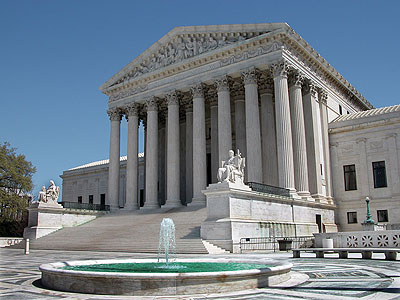 The FISA surveillance act had its day in court yesterday, but the subject was solely whether the act would ever have a real day in court. Adam Serwer explains:
The FISA surveillance act had its day in court yesterday, but the subject was solely whether the act would ever have a real day in court. Adam Serwer explains:
Here’s what the civil libertarians and human rights activists are upset about: The FISA Amendments Act authorized the warrantless surveillance aimed at targets abroad, including correspondence where one of the points of contact is within the United States. That means the government could spy on American citizens without a warrant or probable cause. Surveillance in cases targeting suspected foreign agents previously had to be approved by a special court. The FISA Amendments Act allowed the government broad latitude to spy without ever needing to ask a judge’s permission, even if that means picking up Americans’ emails and phone calls.
The arguments before the Supreme Court on Monday weren’t about whether this kind of surveillance violates Americans’ constitutional rights. Instead, the justices are deciding whether or not the lawyers, journalists, and human rights activists involved in the case can sue at all. To move forward with their case, the plaintiffs need to prove they have what lawyers call “standing”—they have to prove that the law will affect them. That’s hard because who the government spies on is by definition a secret.
David Savage tells us how things went:
Supreme Court justices were surprisingly skeptical Monday about arguments by a top Justice Department lawyer who in a hearing sought to squelch an anti-wiretapping lawsuit brought by lawyers, journalists and activists.
….[Elena] Kagan said lawyers who represent foreign clients accused of terrorism-related offenses cannot speak to them on the phone. They said they had to fly overseas to speak to them in person. That suggests these plaintiffs have suffered some harm because of the prospect of their calls being overheard, she said….Kennedy said he too found it hard to believe that the NSA is not engaged in broad monitoring of international calls.
“The government has obtained this extraordinarily wide-reaching power,” he said. “It is hard for me to think the government isn’t using all of the powers at its command under the law.”
This is obviously a tiny victory, but it’s a victory nonetheless. The government has been playing this card for over a decade, claiming that literally no one has standing to sue over its secret surveillance programs because no one can prove they’ve been surveilled. It’s an absurd Catch-22, and the court is right to be skeptical of it. One way or another, there should always be somebody who has standing to challenge a law in court. Even if the Supreme Court eventually rules that FISA and its amendments are all constitutional, it would be nice to at least get a ruling that no law is entirely unassailable merely due to technicalities of standing.


















